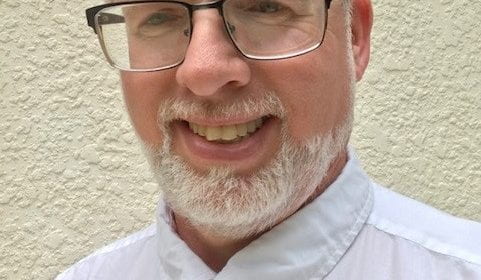PFRDG Grant to Study Impact of Microgravity on Cancer Cells


Randall Gregg, Ph.D. is an Associate Professor of Microbiology and Immunology and Director of Student Research in the Department of Foundational Sciences in NSU’s Dr. Kiran C. Patel College of Osteopathic Medicine (KPCOM). He was recently funded by NSU’s seed funding program, the President’s Faculty Research & Development Grant (PFRDG), in the amount of $15,000 for his project titled “Simulated microgravity effect upon CD8+ T cell activation and control of melanoma.”
Tell me about your recent grant-funded project.
The grant is focused on supporting the missions of NASA (National Aeronautics and Space Administration) and other space agencies such as SpaceX by examining some of the chief problems for astronauts during long-term spaceflight, such as dysfunctional immune reactivity acquired during exposure to microgravity.
The experiments in the grant employ an earth-based model system designed by NASA, the Rotary Cell Culture System (RCCS), to understand defects of T-cell function, specifically CD8+ T cells. The RCCS simulates microgravity similar to that experienced by astronauts onboard the International Space Station (ISS). Currently, it is unknown how CD8+ T cells or cytotoxic T cells respond to microgravity. It is important to understand this response as cytotoxic T cells are the primary response to control and eliminate viral infected cells and tumors. To understand the effect of simulated microgravity on T cells we have to examine dendritic cells, which operate to activate peptide-specific T cells. Additionally, the work examines the impact of simulated microgravity upon melanoma cells, targets of the CD8+ T cell response.

Rotary Cell Culture System (RCCS) for simulating microgravity
There are three aims to this grant: 1) Examine dendritic cell function in simulated microgravity; 2) assess melanoma cell growth, viability and susceptibility to T cell-mediated cytotoxicity upon simulated microgravity exposure; and 3) determine the extent of dendritic cell activation of CD8+ T cells and T cell-mediated killing of melanoma cells when all occurring in simulated microgravity.
Who is working with you on this project?
My main collaborator is Dr. Natalie Freeman, a molecular biologist at Lincoln Memorial University who will be helping measure the effects of simulated microgravity upon melanoma. There will also be four students from KPCOM working on various experiments of the project.

Dr. Gregg engages with students in his lab
How does this project connect with your other work at NSU?
I currently have three areas of research at NSU: 1) microgravity impact upon the immune system and cancers, for which this grant is a component; 2) mechanisms of viral evasion from immunity, currently working on ebolavirus; and 3) development of a universal vaccine platform for use in preventing or treating infectious diseases and cancers.
Presently, I am working on constructs for bacterial meningitis, pneumococcal pneumonia, and melanoma. The vaccines will be tested for efficacy against these diseases through collaboration with Dr. Sarah Clark at the University of Colorado Anschutz Medical Campus.
What advice do you have for other grant seekers at NSU?
The PFRDG is a good first step for researchers to get funded research started at NSU. I also suggest that faculty work closely with the grants department at NSU (called the Division of Research and Economic Development; DoR) as they can help with finding funding, reviewing proposals, and working through the grant process. Finally, I suggest contacting the Scientific Officer at different funding agencies to get feedback on project ideas and assess the fit between their project idea and a given funding opportunity.

What is your hope for the outcomes in this project and expanding on it in the future?
The main goal of this grant project is to acquire data that can be incorporated into a NASA proposal for testing onboard the ISS, with future application of the findings for actual spaceflight. This new proposal will investigate the signaling mechanisms underlying how microgravity alters cell characteristics and function.
This should lead to the development of countermeasures for use in astronauts to preserve immune status and augment action against infectious agents and possibly cancers. Insight into how microgravity stress influences cancer growth may lead to generation of new targeted therapeutics to benefit patients on Earth.